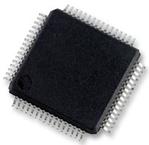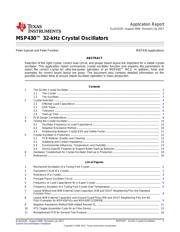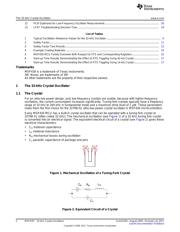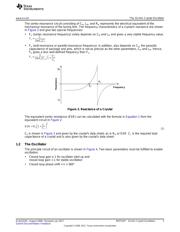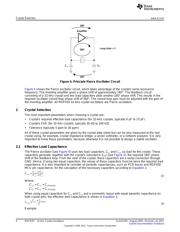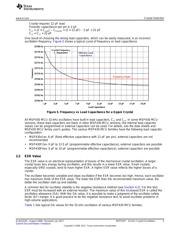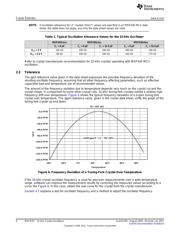herunterladen

1
SLAA322DâAugust 2006âRevised July 2017
Submit Documentation Feedback
Copyright © 2006â2017, Texas Instruments Incorporated
MSP430⢠32-kHz Crystal Oscillators
Application Report
SLAA322DâAugust 2006âRevised July 2017
MSP430⢠32-kHz Crystal Oscillators
Peter Spevak and Peter Forstner............................................................................. MSP430 Applications
ABSTRACT
Selection of the right crystal, correct load circuit, and proper board layout are important for a stable crystal
oscillator. This application report summarizes crystal oscillator function and explains the parameters to
select the correct crystal for ultra-low-power operation of an MSP430⢠MCU. In addition, hints and
examples for correct board layout are given. The document also contains detailed information on the
possible oscillator tests to ensure stable oscillator operation in mass production.
Contents
1 The 32-kHz Crystal Oscillator.............................................................................................. 2
1.1 The Crystal .......................................................................................................... 2
1.2 The Oscillator........................................................................................................ 3
2 Crystal Selection............................................................................................................. 4
2.1 Effective Load Capacitance ....................................................................................... 4
2.2 ESR Value........................................................................................................... 5
2.3 Tolerance ............................................................................................................ 6
2.4 Start-up Time........................................................................................................ 7
3 PCB Design Considerations................................................................................................ 8
4 Testing the Crystal Oscillator ............................................................................................. 10
4.1 Oscillator Frequency vs Load Capacitance.................................................................... 10
4.2 Negative Resistance Method .................................................................................... 10
4.3 Relationship Between Crystal ESR and Safety Factor....................................................... 11
5 Crystal Oscillator in Production........................................................................................... 12
5.1 PCB Material, Quality, and Cleaning ........................................................................... 12
5.2 Soldering and Contact Impedance.............................................................................. 13
5.3 Environmental Influences, Temperature, and Humidity...................................................... 13
5.4 Device-Specific Features to Support Better Start-up Behavior.............................................. 14
6 Hardware Troubleshoot for Crystal-Oscillator Start-up in Production ............................................... 18
7 References.................................................................................................................. 20
List of Figures
1 Mechanical Oscillation of a Tuning-Fork Crystal ........................................................................ 2
2 Equivalent Circuit of a Crystal.............................................................................................. 2
3 Reactance of a Crystal...................................................................................................... 3
4 Principle Pierce Oscillator Circuit.......................................................................................... 4
5 Frequency vs Load Capacitance for a 0-ppm Crystal .................................................................. 5
6 Frequency Deviation of a Tuning-Fork Crystal Over Temperature.................................................... 6
7 Layout Without and With External Load Capacitors (XIN and XOUT Neighboring Pins Are Standard
Function Pins)................................................................................................................ 9
8 Layout With External Capacitors and Ground Guard Ring (XIN and XOUT Neighboring Pins Are NC
Pins) Examples for MSP430F41x and MSP430F1232IRHB........................................................... 9
9 Negative Resistance Method With Added Resistor R
Q
............................................................... 11
10 XTS Toggle Assembler Code for an F4xx Device ..................................................................... 15
11 Nonoptimized PCB for General Test Purpose.......................................................................... 16

